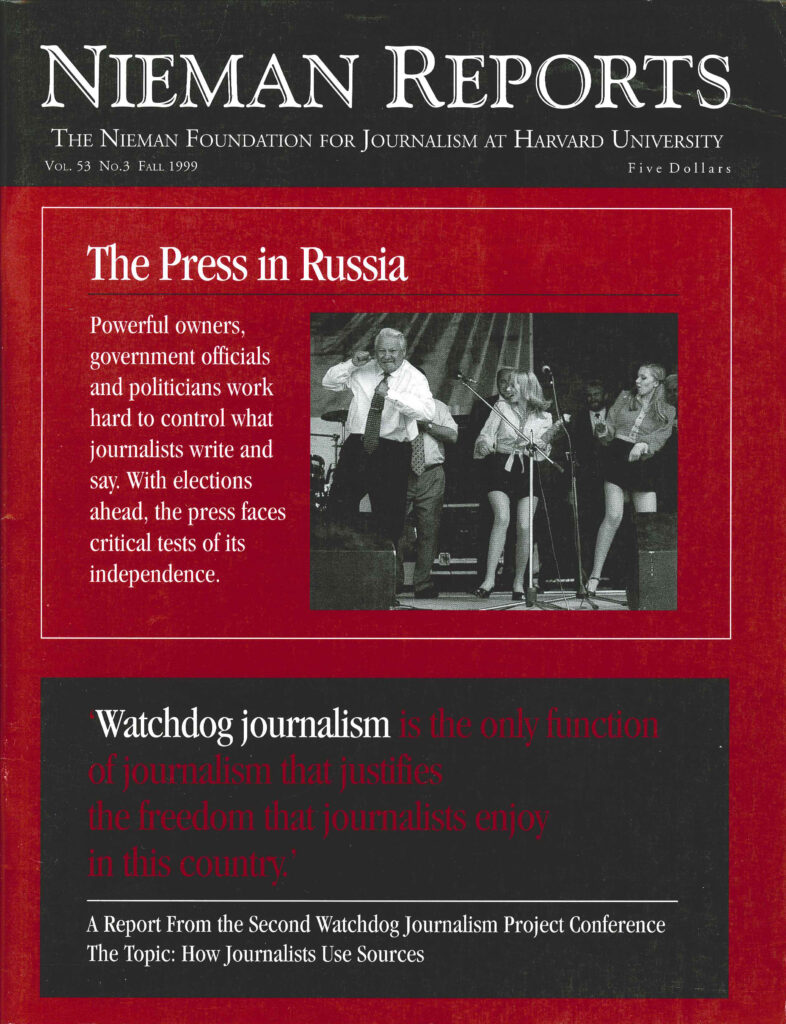
The Press in Russia
Powerful owners, government officials and politicians work hard to control what journalists write and say. With elections ahead, the press faces critical tests of its independence.
How Journalists Use Sources
A report from the Second Watchdog Journalism Project Conference
Journalists meet to talk about the relationships that reporters have with their sources and to examine the potential consequences posed by changes in how sources are treated by reporters and how sources treat reporters.
‘Watchdog journalism is the only function of journalism that justifies the freedom that journalists enjoy in this country.’
—Bill Kovach, Curator, Nieman Foundation
Bill Kovach began the conference with introductory remarks focused on coverage of the Clinton/Lewinsky story which, in his view, epitomizes many of the consequences of a shift in how sources are used.
This year, the Clinton/Lewinsky story has highlighted the extraordinary degree to which American reporting, especially in Washington, has put itself in a position to be manipulated by those who have a vital interest in the outcome of the story. One impact of the new technology has been to shift the power relationship toward the sources of the information and away from the news organizations that cover them. Increasingly, sources usurp the gate-keeping role of the journalist to dictate the terms of the interaction, the conditions under which the information will be released, and the timing of publication. This is a power shift so dramatic that I believe it can destroy journalistic independence and certainly it changes the whole notion of journalistic distance.
If you think this is a radical conclusion, we now have the testimony of Michael Isikoff in his book, “Uncovering Clinton,” in which he says he realized that he stepped across the line from being a reporter to a participant. “I was trying to influence the action of the players,” he wrote of trying to persuade Lucianne Goldberg and Linda Tripp not to negotiate a book deal that would compromise the credibility of his sources. “As a reporter, that’s not my job,” Isikoff goes on to tell us. “But I didn’t realize something else. I was at this point too involved to avoid influencing the players of the story.”
Some argue that the ultimate outcome of the story—President Clinton’s ultimate admissions—is a vindication of the press’s role in the unfolding story. But this “ends justify the means” argument is, as former Washington Post reporter Murrey Marder has reminded us, too self-serving for any self-respecting journalist to make….
For those who are convinced that watchdog journalism—the monitoring of the institutions of power—is the central purpose of a free press, it is vital that we examine the reporter/source relationship and how it shapes our reporting today.
It is questions such as these that we hope to explore and examine today. We do so in the hope that with enough thought and enough discussion we can begin to find ways to redress the imbalance of power between reporters and sources that the competitive atmosphere of the new technology and the new economic organization of the journalism business have created.
As moderator of the discussion about reporting on nonprofits, Kovach also explained why it is increasingly important that journalists retain their role as vigilant watchdogs of these organizations at a time when the social service work of large public agencies is diminishing.
Most news organizations do not and have not covered nonprofits. But as the power of government devolves, and it’s devolving rapidly to state and local government in terms of social programs, those aspects of public life are, in many cases, being picked up by or left to nonprofit organizations to handle. And in this time of enormous wealth creation during the past decade, an awful lot of money has moved into fewer and fewer hands at the top of the economic structure of our country. More and more of those people who are collecting more and more personal fortune are choosing to withdraw their support from government by investing their profits in nonprofit organizations targeted to things in which they are personally interested.
As broad-based support for public programs dissipates, the power of nonprofits again is becoming more and more important to how our society is structured….
Since 1970, this area of nonprofit organizations has grown four times faster than the overall economy, which itself has grown pretty steadily. For the last two years, the IRS reports they have been granting new tax exemptions to 75 organizations per day. That’s on top of nearly 1.5 million nonprofit organizations that have federal exemptions from taxes. In 1997, the federal tax exemptions alone withdrew $21 billion from the national treasury. State and local tax exemptions added another 30-plus billion to that….
All sorts of aspects of our social and political activity take place at the direction of private money through nonprofit organizations. And the journalistic problem attached to that is that these are private organizations and private money and journalistic access to those precincts is not nearly as clear as it is to government organizations.
Jim Tharpe, an editor who has led several lengthy investigations of nonprofits, echoed Kovach’s admonition of the need to report on nonprofits but also described the effort to do so as one that demands enormous tenacity from reporters.
“I’d never done any reporting on nonprofits. I thought they were all good guys. They were mom and pop, bake sale, raise money for the local fire department types. I had no idea how sophisticated they were, how much money was raised, and how little access you have to them as a reporter….We had access to 990’s [mandatory financial records filed to the government by nonprofits] which tell you very little, but they are a good starting point…. If I had advice for anybody looking into a nonprofit, it would be this: It’s the most tenacious story. You have to be more tenacious in your pursuit than anything else I’ve ever been a part of…. We [at the Montgomery (AL) Advertiser] were accused of attacking essentially the Mother Theresa of Montgomery, that being Morris Dees in the Southern Poverty Law Center.”
Being a watchdog on national security issues requires its own set of strategies to get past some of the bureaucratic hurdles put up by military and diplomatic organizations. And it requires that journalists find ways to work around the hurdles to avoid being “handled” by sources in ways that stifle their abilities to monitor the events of their beat. Several reporters recalled times in which their judgment and/or persistence had to prevail in order for them—or others—to develop and publish important stories.
Susanne M. Schafer: “In order to cover a bureaucracy as large as the military, as large as the Pentagon, what you’ve got to fight for is that ability to get out there and interview the soldier in the trench, the lady in the cockpit. It’s very hard to do, but that’s the only way you’re going to get beyond what I call death by briefing. You can waste hours and hours listening to those people, and that’s exactly what they want to do. They want to entrap us there…. [there is a need to] get beyond what people in Washington are telling you the story is to the reality of what it is on the ground.”
Murrey Marder: “I got a call one day from Dick Duggin from the St. Louis Post Dispatch, who was a first-class reporter during the Vietnam War. It was on a Sunday. Dick said he had just gotten a call from the White House. ‘One of the presses in the White House is telling me if we print a story I’m working on, it will jeopardize national security,’ Dick said. ‘Has this happened to you?’
“I burst out laughing. He said, ‘What’s so funny?’
“I said, ‘Dick, you don’t realize the advantage you have in appearing in the St. Louis Post Dispatch: The White House doesn’t see your copy. It happens to me all the time.’
“He said, ‘What do you tell them?’
“I said, ‘I generally tell them if they can prove it will jeopardize national security I will consider it, but until then I won’t even think about it.’
“He said, ‘What happens if they prove it to you?’
“‘They never have,’ I replied.”
Roy Gutman: “The Balkan conflicts that we’ve seen from 1991 to now were an example of an event that the establishment, both in government and the elite of the East Coast, preferred to ignore. NATO itself decided that the war against Slovenia and Croatia in 1991 was beneath its field of vision. I once went to see the U.S. Ambassador to NATO. I had just reported for Newsday that the Croatians had repelled an invasion attempt over part of their territory on the Adriatic. I had it down to the last detail of just how it happened, which officer changed sides at which moment, and how they saved basically the middle Adriatic coastline of Croatia.
“The Ambassador told me, ‘We really are not following this matter. What’s your next question?’
“I said, ‘Don’t you want to at least see it? I think this has changed the entire course of the war.’
“‘Well, if you want to leave the article, you can. But this is not something that NATO is following,’ he told me….
“And I think the intention within the U.S. government was to let it happen and to hope that it would happen quickly. Our editors at Newsday who were aware of this had a difficult decision to make. I was the reporter for all of Europe: Why should we justify covering a war that is not seen by anybody in the national security establishment as being of national security concern? How do you get the interest of your editors in something that you feel is really central?”
Business reporting, when it’s done from the perspective of journalists being watchdogs, poses difficulties in terms of finding credible and identifiable sources. These problems are magnified when a story must be told on television, as panel moderator Paul Solman, business correspondent for “The NewsHour with Jim Lehrer,” described.
“[Business reporting is] a unique beat…[with] unique problems with regard to sourcing implicit in what we do…. There are two kinds of problems with sources…. One is the nature of TV itself, and I separate that into physiology and egomania…. The second is the nature of the beat itself, the business and economics beat….
“If you’re doing TV, you are stuck with the sources who are going to appear on camera…because how long can you go on paraphrasing somebody else?
“…of course, there’s the issue of accessibility and my flip use of the word ‘egomania.’ The fact is that if you’re in our business, TV, and particularly reporting on business and economics where people have no obligation or even incentive to talk to you most of the time, then you go with people who are articulate and accessible and are willing to talk to you. Well, who is willing to talk to you? As often as not, it is people—maybe it’s a gross characterization to call them ‘egomaniacs,’ exhibitionists might be a little milder—but it is certainly people who want to be out there, like to hear themselves talk, like to be heard. And in the world of business and economics, where people are being paid to manage this process, their clients, that is to say the CEO’s and spokespeople from the corporation, they’re given TV training now and have been for years, to do this well. So viewers are seeing again a sub-sample of a sub-sample….
“So there’s this entire issue of source management that we all face, but we face it particularly within our beat.”
—Bill Kovach, Curator, Nieman Foundation
Bill Kovach began the conference with introductory remarks focused on coverage of the Clinton/Lewinsky story which, in his view, epitomizes many of the consequences of a shift in how sources are used.
This year, the Clinton/Lewinsky story has highlighted the extraordinary degree to which American reporting, especially in Washington, has put itself in a position to be manipulated by those who have a vital interest in the outcome of the story. One impact of the new technology has been to shift the power relationship toward the sources of the information and away from the news organizations that cover them. Increasingly, sources usurp the gate-keeping role of the journalist to dictate the terms of the interaction, the conditions under which the information will be released, and the timing of publication. This is a power shift so dramatic that I believe it can destroy journalistic independence and certainly it changes the whole notion of journalistic distance.
If you think this is a radical conclusion, we now have the testimony of Michael Isikoff in his book, “Uncovering Clinton,” in which he says he realized that he stepped across the line from being a reporter to a participant. “I was trying to influence the action of the players,” he wrote of trying to persuade Lucianne Goldberg and Linda Tripp not to negotiate a book deal that would compromise the credibility of his sources. “As a reporter, that’s not my job,” Isikoff goes on to tell us. “But I didn’t realize something else. I was at this point too involved to avoid influencing the players of the story.”
Some argue that the ultimate outcome of the story—President Clinton’s ultimate admissions—is a vindication of the press’s role in the unfolding story. But this “ends justify the means” argument is, as former Washington Post reporter Murrey Marder has reminded us, too self-serving for any self-respecting journalist to make….
For those who are convinced that watchdog journalism—the monitoring of the institutions of power—is the central purpose of a free press, it is vital that we examine the reporter/source relationship and how it shapes our reporting today.
- How much socializing among reporters and sources is acceptable?
- How much information trading is acceptable?
- What about giving advice to a private source?
- What about helping a source financially?
- Can a reporter deceive a source, expose a source? If so, when and why?
It is questions such as these that we hope to explore and examine today. We do so in the hope that with enough thought and enough discussion we can begin to find ways to redress the imbalance of power between reporters and sources that the competitive atmosphere of the new technology and the new economic organization of the journalism business have created.
As moderator of the discussion about reporting on nonprofits, Kovach also explained why it is increasingly important that journalists retain their role as vigilant watchdogs of these organizations at a time when the social service work of large public agencies is diminishing.
Most news organizations do not and have not covered nonprofits. But as the power of government devolves, and it’s devolving rapidly to state and local government in terms of social programs, those aspects of public life are, in many cases, being picked up by or left to nonprofit organizations to handle. And in this time of enormous wealth creation during the past decade, an awful lot of money has moved into fewer and fewer hands at the top of the economic structure of our country. More and more of those people who are collecting more and more personal fortune are choosing to withdraw their support from government by investing their profits in nonprofit organizations targeted to things in which they are personally interested.
As broad-based support for public programs dissipates, the power of nonprofits again is becoming more and more important to how our society is structured….
Since 1970, this area of nonprofit organizations has grown four times faster than the overall economy, which itself has grown pretty steadily. For the last two years, the IRS reports they have been granting new tax exemptions to 75 organizations per day. That’s on top of nearly 1.5 million nonprofit organizations that have federal exemptions from taxes. In 1997, the federal tax exemptions alone withdrew $21 billion from the national treasury. State and local tax exemptions added another 30-plus billion to that….
All sorts of aspects of our social and political activity take place at the direction of private money through nonprofit organizations. And the journalistic problem attached to that is that these are private organizations and private money and journalistic access to those precincts is not nearly as clear as it is to government organizations.
Jim Tharpe, an editor who has led several lengthy investigations of nonprofits, echoed Kovach’s admonition of the need to report on nonprofits but also described the effort to do so as one that demands enormous tenacity from reporters.
“I’d never done any reporting on nonprofits. I thought they were all good guys. They were mom and pop, bake sale, raise money for the local fire department types. I had no idea how sophisticated they were, how much money was raised, and how little access you have to them as a reporter….We had access to 990’s [mandatory financial records filed to the government by nonprofits] which tell you very little, but they are a good starting point…. If I had advice for anybody looking into a nonprofit, it would be this: It’s the most tenacious story. You have to be more tenacious in your pursuit than anything else I’ve ever been a part of…. We [at the Montgomery (AL) Advertiser] were accused of attacking essentially the Mother Theresa of Montgomery, that being Morris Dees in the Southern Poverty Law Center.”
Being a watchdog on national security issues requires its own set of strategies to get past some of the bureaucratic hurdles put up by military and diplomatic organizations. And it requires that journalists find ways to work around the hurdles to avoid being “handled” by sources in ways that stifle their abilities to monitor the events of their beat. Several reporters recalled times in which their judgment and/or persistence had to prevail in order for them—or others—to develop and publish important stories.
Susanne M. Schafer: “In order to cover a bureaucracy as large as the military, as large as the Pentagon, what you’ve got to fight for is that ability to get out there and interview the soldier in the trench, the lady in the cockpit. It’s very hard to do, but that’s the only way you’re going to get beyond what I call death by briefing. You can waste hours and hours listening to those people, and that’s exactly what they want to do. They want to entrap us there…. [there is a need to] get beyond what people in Washington are telling you the story is to the reality of what it is on the ground.”
Murrey Marder: “I got a call one day from Dick Duggin from the St. Louis Post Dispatch, who was a first-class reporter during the Vietnam War. It was on a Sunday. Dick said he had just gotten a call from the White House. ‘One of the presses in the White House is telling me if we print a story I’m working on, it will jeopardize national security,’ Dick said. ‘Has this happened to you?’
“I burst out laughing. He said, ‘What’s so funny?’
“I said, ‘Dick, you don’t realize the advantage you have in appearing in the St. Louis Post Dispatch: The White House doesn’t see your copy. It happens to me all the time.’
“He said, ‘What do you tell them?’
“I said, ‘I generally tell them if they can prove it will jeopardize national security I will consider it, but until then I won’t even think about it.’
“He said, ‘What happens if they prove it to you?’
“‘They never have,’ I replied.”
Roy Gutman: “The Balkan conflicts that we’ve seen from 1991 to now were an example of an event that the establishment, both in government and the elite of the East Coast, preferred to ignore. NATO itself decided that the war against Slovenia and Croatia in 1991 was beneath its field of vision. I once went to see the U.S. Ambassador to NATO. I had just reported for Newsday that the Croatians had repelled an invasion attempt over part of their territory on the Adriatic. I had it down to the last detail of just how it happened, which officer changed sides at which moment, and how they saved basically the middle Adriatic coastline of Croatia.
“The Ambassador told me, ‘We really are not following this matter. What’s your next question?’
“I said, ‘Don’t you want to at least see it? I think this has changed the entire course of the war.’
“‘Well, if you want to leave the article, you can. But this is not something that NATO is following,’ he told me….
“And I think the intention within the U.S. government was to let it happen and to hope that it would happen quickly. Our editors at Newsday who were aware of this had a difficult decision to make. I was the reporter for all of Europe: Why should we justify covering a war that is not seen by anybody in the national security establishment as being of national security concern? How do you get the interest of your editors in something that you feel is really central?”
Business reporting, when it’s done from the perspective of journalists being watchdogs, poses difficulties in terms of finding credible and identifiable sources. These problems are magnified when a story must be told on television, as panel moderator Paul Solman, business correspondent for “The NewsHour with Jim Lehrer,” described.
“[Business reporting is] a unique beat…[with] unique problems with regard to sourcing implicit in what we do…. There are two kinds of problems with sources…. One is the nature of TV itself, and I separate that into physiology and egomania…. The second is the nature of the beat itself, the business and economics beat….
“If you’re doing TV, you are stuck with the sources who are going to appear on camera…because how long can you go on paraphrasing somebody else?
“…of course, there’s the issue of accessibility and my flip use of the word ‘egomania.’ The fact is that if you’re in our business, TV, and particularly reporting on business and economics where people have no obligation or even incentive to talk to you most of the time, then you go with people who are articulate and accessible and are willing to talk to you. Well, who is willing to talk to you? As often as not, it is people—maybe it’s a gross characterization to call them ‘egomaniacs,’ exhibitionists might be a little milder—but it is certainly people who want to be out there, like to hear themselves talk, like to be heard. And in the world of business and economics, where people are being paid to manage this process, their clients, that is to say the CEO’s and spokespeople from the corporation, they’re given TV training now and have been for years, to do this well. So viewers are seeing again a sub-sample of a sub-sample….
“So there’s this entire issue of source management that we all face, but we face it particularly within our beat.”


